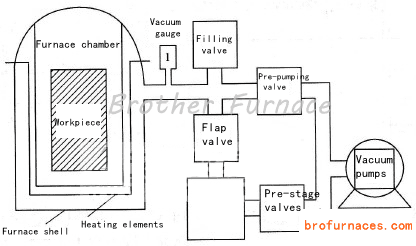What’s the vacuum furnace
A vacuum furnace is a type of furnace in which the product in the furnace is surrounded by a vacuum during processing. The absence of air or other gases prevents oxidation, and heat loss from the product through convection, and removes a source of contamination.
Vacuum furnace structure and schematic diagram
A vacuum furnace refers to the use of vacuum systems (consisting of vacuum pumps, vacuum measuring devices, vacuum valves, etc.) in the specific space of the furnace chamber to remove the air from the furnace chamber so that the pressure in the chamber is less than a standard atmospheric pressure, the space in the furnace chamber to achieve a vacuum, and then heat the workpiece.

Vacuum furnace chamber
The vacuum furnace chamber is mainly divided into a stainless steel chamber, ceramic fiber chamber, molybdenum foil chamber, and graphite chamber. The maximum temperature ranges from 750°C to 2200°C.
Vacuum furnace heating elements
Vacuum furnace heating elements are mainly divided into resistance wire, silicon carbon rod, molybdenum wire and rod, silicon molybdenum rod, graphite, induction coil, etc. The maximum temperature ranges from 750℃ to 2200℃.
Temperature control system
The temperature control system of the vacuum furnace is mainly composed of thermocouples (temperature measurement) and temperature controllers (temperature control). It is mainly divided into PID programmable control, touch screen control, and PLC fully automatic control.
Vacuum System
The vacuum system consists of vacuum valves, mechanical pumps, diffusion pumps and Roots pumps according to the required vacuum level. The maximum vacuum level is generally 7×10-3 Pa.
Water cooling system
According to the size of the furnace chamber, a matching water cooling system is required to ensure that the vacuum furnace can work properly.
Sealed furnace shell
The furnace shell casing must be well sealed to ensure that the designed vacuum level can be achieved.
Vacuum furnace working principle
The simple working principle of the vacuum furnace is that the furnace chamber is pumped through the vacuum system to achieve a vacuum. Then the heating element is heated, and the temperature control system controls the heating speed and holding time so that the material is heated under the vacuum.
Check out our Vacuum Furnaces:
- Vacuum Brazing Furnace
- Vacuum Furnace up to 1700℃
- Vacuum Induction Melting Furnace
- Graphite Vacuum Furnace up to 2200℃
- Vacuum Gas Quenching Furnace
- Vacuum Hot Press Furnace
Follow us on Facebook